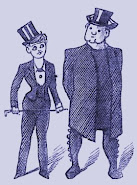Folk Singer Joan Baez
(somewhat) immortalized in Li'l Abner
by Rick Marschall
The year was 1967. The times have been a-changin' -- because those days of protests, riots, free love, folk music, the "sexual revolution," and the drug culture seem like a world away from us today. In fact, those days were a world away from, even, 1963. Yeah, the Sixties, man.
Well, a bit of a personal tale will pop up here. My "mind" raced back in time because last week the iconic folk singer Joan Baez had a birthday. I was in college and to paraphrase a Bible verse, I was in that generation but not of that generation. But the counter-culture, especially its music, was hard to avoid.
Whatever fertile ground there was for a cultural paradigm-shift was suffused by the Vietnam war. One of the leading "protest singers" was Joan Baez. Other singers included her on-again/off-again lover Bob Dylan. Hippies and Yippies would make courtroom-headlines the next year. And drug advocates like Dr Timothy Leary infested campuses and airwaves.
And, oh yeah, cartoonists. A growing generation of Underground artists congregated in San Francisco, Seattle, and New York. But this is a story about the poster girl of the era, so to speak -- the folk singer Joan Baez.
... at least that is how the cartoonist Al Capp perceived her. The creator of Li'l Abner for years had been a noted liberal. He typically upset the apple cart of the Establishment; he aimed at the personalities and policies of the Right; and enjoyed the blowback. In the late 1960s he changed -- although he later told me that he never moved: society changed, and he just kept attacking hypocrisy and absurdity.
Whatever. When the hippies were ascendant, Capp determined that Baez was their muse, and he built storylines in Li'l Abner around her. He depicted hordes of flea-bitten hippies who belonged not to SDS (Students for a Democratic Society) but to SWINE -- Students Wildly Indignant About Nearly Everything. And their heroine was an ugly, haggish, odoriferous folk singer named Joanie Phoanie.
Subtlety, never a long suit of Capp, had abandoned him. But he was also being asked to run for the US Senate (from Massachusetts, against Ted Kennedy) and he was looking for bludgeons, not rapiers. Was Joanie Phonie a caricature of Joan Baez? TIME magazine reported:
I had connections with Capp at the time that were, ironically, separate from the comics world. I was active in national college youth groups, all political. Swimming upstream, we might say, but instructive and invigorating. Capp was sort of a hero of ours. So I saw him at conferences and speaking events, and helped arrange meetings. Not too many years later I became Comics Editor at his syndicate; and eventually I conducted the last interview he granted.
At one time John Steinbeck wrote that he thought Al Capp deserved the Nobel Prize and was the greatest satirist since Laurence Sterne. At the end of his career even his unabashed comics fans were rather embarrassed by his comic-strip work. In my interview, however, when I asked what period of his career he thought was the best, he said, "The stuff I did last week." But then, still self-aware, he added, "Every creator has to believe that. If he doesn't, he should quit."

















No comments:
Post a Comment